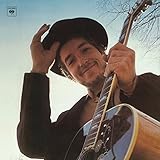Whenever I tell someone that my favorite songwriter is Bob Dylan, the response I usually get is some kind of respectful acknowledgment of his status as a lyricist. And there’s no question that Dylan has written some of the most extraordinary lyrics – depending on the period, and on his mood – they’re wise and weary, playful and inventive, surreal, enigmatic, sometimes inscrutable. Sometimes they’re familiar but then they twist in surprising ways. Rarely are they banal. Rarely are they boring. Even when writing a love song, Dylan finds new language and new ways to express the most familiar feelings of all.
So, yes, a great lyricist. Whole books have been written, whole careers launched, with discussion of the lyrics of Bob Dylan. But reading Bob Dylan and listening to Bob Dylan are two completely different experiences. And it’s his melodies, vocal phrasing and musical arrangements that lift these masterful words off the page, animating them, haunting them, imbuing them with mystery.

 Consider the album John Wesley Harding. Recorded in Nashville, just as 1967 was giving in to 1968, just a few months after recording The Basement Tapes, those legendary home recordings that would begin popping up on bootlegs in the late 60s. The Basement Tapes retained much of the surreal imagery of the 1965-66 albums, but without the amphetamine rush, and without the grandeur. The Basement Tapes (recorded with members of what would soon be The Band) came across as looser, playfully laconic.
Consider the album John Wesley Harding. Recorded in Nashville, just as 1967 was giving in to 1968, just a few months after recording The Basement Tapes, those legendary home recordings that would begin popping up on bootlegs in the late 60s. The Basement Tapes retained much of the surreal imagery of the 1965-66 albums, but without the amphetamine rush, and without the grandeur. The Basement Tapes (recorded with members of what would soon be The Band) came across as looser, playfully laconic.
 And a year or so after John Wesley Harding, Dylan would be back in Nashville, recording Nashville Skyline. Lovely in its own way, full of country ballads and country honk, “Lay Lady Lay” and “Nashville Skyline Rag.” Formal, a very specific style governing the album; lyrically modest, straightforward, voiced by a Dylan no one had really heard before or since.
And a year or so after John Wesley Harding, Dylan would be back in Nashville, recording Nashville Skyline. Lovely in its own way, full of country ballads and country honk, “Lay Lady Lay” and “Nashville Skyline Rag.” Formal, a very specific style governing the album; lyrically modest, straightforward, voiced by a Dylan no one had really heard before or since.
So then: John Wesley Harding, sandwiched between two quite different and unusual projects, sounding like neither. An acoustic album, but surprisingly fast, focused, tight. Urgent drums pushing forward, but not frilly. Acoustic guitar and occasional piano and bass. Harmonica sometimes taking the lead, not just coming in for punctuation. So, an acoustic record, but not folk. Full of muted rock drums, so rock in an unusual way, but not electrified. And despite its Nashville roots, not country. And definitely not “country rock.” And through it all, a voice sounding not quite like any other Dylan voice. Clear, every syllable mattering, mysterious, even a bit pinched and restrained. Tight-lipped.
The lyrics draw from the old west; there is biblical imagery; there are story-songs, morality tales. Instead of surreal and symbolic, the lyrics are mysterious. Information is withheld. The mystery is in the action, in what the characters are doing. Much is left hanging, including the “why.” Again, tight-lipped lyrics delivered in a tight-lipped voice.
On some songs: the title track, “As I Went Out One Morning” and “All Along the Watchtower,” the urgency is pushed through by rapid bass and drumbeats. Rapid, but quiet. On “All Along the Watchtower,” the harmonica is front and centre, setting up the song, in the same way an electric guitar might in a more conventional rock arrangement. This was before Jimi Hendrix re-imagined the song so completely that subsequent live versions by Dylan abandoned the muted mystery of the John Wesley Harding original for a more extroverted electrified expression. Same words, still ominous and potent, but quite different from the more subtle original.
On the more subdued tracks: “I Dreamed I Saw St. Augustine” and ” I Pity The Poor Immigrant,” the hushed beauty of the vocal melody steers the songs. The muted instrumentation and voice cloak the whole experience, obscuring it, letting the meaning hang.
“The Ballad of Frankie Lee and Judas Priest” is more about structure than melody, packing a great deal of narrative into its economical frame. The instrumentation is deliberately repetitive, and after a while, the hypnotic familiarity of it allows it to almost recede from your attention, letting your mind focus on the story. By the end of it, you feel you’ve been listening to a novel, a morality tale clocking in at a mere five minutes.
One of the best songs on the album, “Drifter’s Escape,” isn’t as long, but it’s just as complete. A tiny, enigmatic, short story. Courtroom drama, social satire and what could either be divine intervention or blind luck, depending on your worldview, all rolled into one. John Wesley Harding is not a rollicking, joyous album. The last two songs: “Down Along The Cove” and “I’ll Be Your Baby Tonight” are lighter fare, more affable, but that only serves to put the rest of the album in stark contrast. It’s a strange, unnerving album, and it leaves you with more questions than answers, and it haunts you long after the final note is played.








